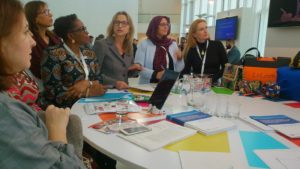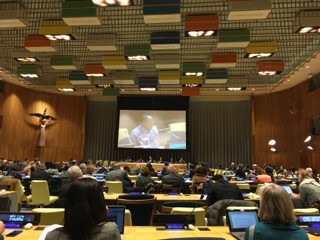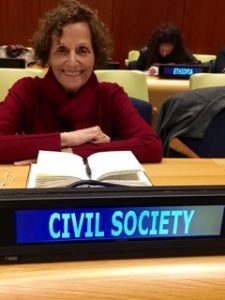This edition of ‘Your Voice at the United Nations’ includes articles on the Global Compact on Migration and UN Environment Assembly.
NGO-CSW Vienna
In November 2017, SI UN Representative in Vienna, Martina Gredler was re-elected as chair of NGO-CSW Vienna. On 24 November, ACUNS/NGO CSW Vienna/UNODC/Committee on Ageing partnered to present an event on Violence Against Older Women in which Martina participated as a panellist.
 On 28 November, during 16 Days of Activism Against Gender-Based Violence Campaign, NGO-CSW Vienna organised an event in collaboration with Soroptimist International, Zonta International, Girls Not Brides and the Inner Wheel focusing on the issue of child marriage. Martina moderated the well attended event. The opening speech was given by the former First Lady of Austria, Margit Fischer, whose husband Heinz Fischer served as Federal President of the Republic of Austria from 2004-2016:
On 28 November, during 16 Days of Activism Against Gender-Based Violence Campaign, NGO-CSW Vienna organised an event in collaboration with Soroptimist International, Zonta International, Girls Not Brides and the Inner Wheel focusing on the issue of child marriage. Martina moderated the well attended event. The opening speech was given by the former First Lady of Austria, Margit Fischer, whose husband Heinz Fischer served as Federal President of the Republic of Austria from 2004-2016:
‘’Of course the situation and the status of women has changed in the last hundred years. Women have reached a lot, particularly in the industrialised world. And it is not my main task to describe this progress in details, but at the same time a great number of problems are still existing and unsolved. Many of them are not even seen, understood and recognised. Many women are in an exposed situation, are particularly vulnerable, and are far away from help and support.
War for instance changes the situation for women and children dramatically overnight. The same goes for forced migration. The number of forced migrants is over 60 million. One element in the spectrum of burdens and sufferings for women is the forced marriage of young girls. It is not a new problem. It is a problem that accompanies girls since many generations, probably since ever, but that does not mean, that it is acceptable, part of the rule and part of the game.
We have a common responsibility: we have to think about it, to discuss about it and to try to find solutions. I believe, that education is an important instrument for improvement and the permanent struggle for equality between men and women.
If article one of the human rights declaration states, that all human beings are born with equal rights and human dignity, than it is logical that it is not only relevant for the moment of birth, but the whole lifetime. Therefore I support and welcome this meeting and discussion, which is devoted to the problems of forced marriage and violation of girls human rights”.
Partnering for impact — achieving the SDGs
SI UN Representative in Vienna, Dora Vrdlovec attended the 17th Session of the General Conference, took place 27 November – 1 December in Vienna, focusing on “Partnering for impact — achieving the Sustainable Development Goals”. The General Conference is UNIDO’s supreme policy making organ where all Member States meet once every two years. UNIDO recognises that partnerships play an important role for achieving inclusive and sustainable industrial development, and meeting the ambitions of the 2030 Agenda to reduce poverty through the SDGs.

A focus group, discussing actions to build on enabling environment for women entrepreneurs.
Hundreds of participants gathered for this Conference, including heads of state and government, ministers and other high-level government officials from around the world, as well as senior representatives of other United Nations organisations, and prominent leaders from the private sector, civil society and academia. The Conference was held in a new format utilising technology such as TEDx (technology, entertainment, and design), and other forms of technology, to present new ideas.
Towards a Pollution-Free Planet
The Nairobi team were busy preparing for the third meeting of the UN Environment Assembly (UNEA 3), which took place on 4 – 6 December 2017, with the High-Level segment taking place on 5 – 6 December, focusing on the theme, “Towards a Pollution-Free Planet”. SI President, Mariet Verhoef-Cohen attended the event also to support the representatives. The main objective of UNEA 3 is to obtain and promote commitments to end pollution. Outcomes were expected to include: a political declaration on pollution, linked to the Sustainable Development Goals (SDGs); resolutions and decisions adopted by Member States to address specific dimensions of pollution; voluntary commitments by governments, private sector entities and civil society organisations to clean up the planet; and the Clean Planet Pledge, a collection of individual commitments to take personal action to end pollution in all its forms.

UNEP Deputy Executive Director Ibrahim Thiaw, Women for Water Representative in Nairobi Asha Abdulraham, Ambassador Makena Kenya Mission to UNON, SI UN Representative in Nairobi Mary Muia
The UN Representatives in Kenya worked with the Women’s Major Group to submit a statement outlining the gender specific effects of pollution. Below is an excerpt from the statement:
“While noting that the environmental pillar of sustainable development is a key driver for human livelihoods and well-being, different forms of pollution pose a grave threat to human health, especially women and girls. Non-conventional forms of pollution, such as genetic, nuclear, electromagnetic pollution as well as pollution coming from geo-engineering and other climate related technologies have not yet been addressed and UNEA-3 bears a responsibility in doing so.
Hence, although we see in the Declaration key issues related to pollution, we believe that it still lacks some of the most pressing ones if the goal of ending pollution in all its forms is to be achieved. Besides, the language in the outcome documents should reflect diversity of all stakeholders involved and recognize the importance of each and everyone of them as agents of change, including by highlighting the vital role that women from indigenous and local communities have played in curbing pollution. Yet, most victims from air, water and food pollution continue to be women and girls.
Women’s and men’s health is affected differently by pollution and we need to understand biological factors and gender roles in order to find solutions. Women and girls are more prone to exposure to chemicals, including persistent and hormone disrupting pollutants which in early years leads to irreversible damage, therefore they need protection. Current research efforts have observed possible correlations between exposures to environmental toxins and the development of disease and illness, including cancer, reproductive dysfunction, and immunologic and neurologic impairment. Thus, mainstreaming gender in pollution responses must include a gender perspective”.
Global Compact on Migration
Continuing the two-year process to produce a global compact on migration, (GCM), on 18 December, SI Representative in New York, Barbara Rochman, attended a three-hour hearing focusing on the importance of a whole-of-society approach to migration. H.E. Miroslav Lajčák, President of the UN General Assembly opened the hearing explaining:
“Governments decide on the laws and policies related to migration – from security to education, health and employment…. This is why they will be the main drivers of the negotiation process, due to start in February, 2018. But migration affects whole societies. Which means that societies must be involved in responding to it. And so we need to listen to many different perspectives. These must come from health workers, border police, NGOs, teachers, community leaders, social welfare officials and migrants themselves. These stakeholders do not set the laws or policies. But they are the ones to implement them, interact with them, and feel the effect of them. And so their voices are just as important”.

Third informal interactive and multi-stakeholder hearing
Louise Arbour, Special Representative of the UN Secretary-General for International Migration, stated that the GCM must enhance multi-lateral cooperation, be people-centered and take a whole-of- society approach. There are misperceptions about migrants bordering on xenophobia and they must be countered.
John Bingham, Head of Policy at the International Catholic Migration Commission and Coordinator of Civil Society Activities of the Global Forum on Migration and Development gave a briefing on the civil society stocktaking meeting, December 4 – 6, 2017, in Puerto Vallarta, Mexico. John reported that there was a focus on conversations amongst UN member states and civil society members about NOW and HOW – Ten Acts for the Global Compact on Migration, which has been developed by civil society organisations. The New York Declaration for Refugees and Migrants, which was adopted by 193 UN member states in 2016, laid out a minimum baseline for the GCM. He also pointed out that the lack of legal channels for migration lead to smuggling and human trafficking.

SI UN Representative in New York, Barbara Rochman
Points of concern raised during the hearing:
Information and language skills: Often migrants are isolated and have no knowledge of their rights and what redress they have. Grassroots migrants must participate in the policy formation process. Bridges can be created between new and long-time migrants. Volunteers assist the newcomers, and help with learning the language, meet health needs and teaching specific skills. Community organisations can teach language skills. Several speakers emphasised how essential learning the language is for migrants.
Employment; recruitment: Over 90% of migration is work-related. The point of recruitment generally determines if the workers will have access to their full labour rights. Temporary worker programs facilitate abuse. Mobility is a human right, and the human rights of migrant workers and their full labour rights, including safe and humane working conditions and collective bargaining, must be in the GCM.
Education of children: Children migrants must have access to education, without fear of repatriation. Some children have no documents, and that makes it difficult for them to be enrolled in schools. All levels must work together to make sure that these barriers are overcome and that children will be educated.
Health care: There must be health care including reproductive health care for women and girls.
Social Inclusion; data collection: Inclusion and integration of migrants must be a focus, and civil society can play a role in making this happen. There should be creation and testing of the kinds of frameworks of the whole-of-society approach to determine who is being excluded at the national level. There is a need to enhance capacity for local data collection. The private sector can play a role in data collection.
Strengthen frameworks for cooperation: There is a need to strengthen the codes governing the international framework of direct cooperation amongst states of departure, transit and destination. Strengthened coordination of UN actors and local organisations is needed, as there are so many UN agencies to deal with.
Implementation and follow-up: There must be a strong focus on implementation of the GCM, follow-up and review. The GCM should move away from current models of protecting migrants, to implementation of accountability mechanisms, including targets.
Concluding remarks by H.E. Jürg Lauber, Permanent Representative of Switzerland to the UN, and H.E. Juan José Gómez Camacho, Permanent Representative of Mexico to the UN, co-facilitators of the intergovernmental consultations and negotiations of the global compact for safe, orderly and regular migration. Both agreed that Puerto Vallarta was a reaffirmation of the NY Declaration and that the logic of the first phase taught them a lot and that the language of member states has evolved. They can move on to the zero draft, bring in migrant’s views and bring that back to New York.
Lead Image: Left to right – SI UN Representative in Nairobi, Rose Mwangi, SI President, Mariet Verhoef-Cohen, Women for Water Partnership Representative in Nairobi, Asha Abdulrahman, SIE Programme Director 2015 – 2017, Marlène van Benthem.

